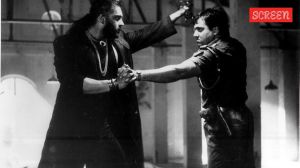Stay updated with the latest - Click here to follow us on Instagram
Watching Ennu Swantham Sreedharan in the times of The Kerala Story
When the controversy surrounding The Kerala Story was raging, former Kerala minister Thomas Isaac tweeted, “We did not ban it. It doesn’t matter. Not many in Kerala watch it…” Maybe because many Subaidas and Sreedharans still live their lives in Kerala.
 A still from the movie Ennu Swantham Sreedharan
A still from the movie Ennu Swantham Sreedharan It is not everyday that a film from the south, minus publicity blitz, a megastar hero, and world-class VFX, attracts audiences to a cinema hall in north India. But on Friday, when a small-budget Malayalam film was screened in Delhi, the theatre was almost packed to capacity.
Not one audience member seemed unmoved as “Ennu Swantham Sreedharan” (Yours truly, Sreedharan) was screened at Jawahar Bhavan on Rajendra Prasad Road in the capital after capturing hearts with its few shows in other parts of the country.
Narrating the story of Sreedharan, a boy from a Hindu family, who along with his two elder sisters, was raised by a Muslim couple in the coastal state, the film is being hailed for telling the “real Kerala story” amid the noise surrounding Hindi film The Kerala Story.
Released earlier this month, the Adah Sharma-starrer, narrating the story of three girls from Kerala who joined the ISIS, has left the audience divided with one section claiming that it showed the “reality” of the southern state, and another dismissing it as propaganda aimed at maligning a state and a religious minority. But while the Hindi film is, going by the makers’ own disclaimer, a fictionalised account, “Ennu Swantham Sreedharan” is based on a real story, the protagonist of which was seen watching his life story played out on the screen from the front row.
 Director Siddik Paravoor (left) with Sreedharan.
Director Siddik Paravoor (left) with Sreedharan.
“For me, Umma is my mother and was my world… I don’t have any memory of my Amma (his biological mother),” said a teary-eyed Sreedharan as he remembered the woman who raised him. By Umma, he was referring to Thengadan Subaida, the woman who raised him after his mother died decades ago.
Sreedharan’s unique story first came to light in July 2019, when he shared the news of the demise of his “Umma” (a term used to address a mother in Muslim families in Kerala), on Facebook. The post raised queries about how a Hindu man had an Umma. In a second post, Sreedharan told the readers how.
Part of his post in Malayalam read: “…The day my mother died, this umma and uppa (father) brought us to their house. They gave us an education, just like they did for their own children. When my sisters reached a marriageable age, it was uppa and umma who married them off. They took us in not because they didn’t have children. They had three kids. Even though they adopted us at a young age, they did not try to convert us into their religion. People say that an adoptive mother can never match up to one’s biological mother. But she was never an ‘adoptive mother’ to us, she was truly our mother.”
Film director Siddik Paravoor chanced upon this post, and “Ennu Swantham Sreedharan” was born.
Calling himself a “living example” of brotherhood in Kerala, Sreedharan said, “I have heard that umma used to breastfeed me and Jafer together.” Jafer is a biological child of Subaida.
For Subaida, known for her philanthropic works, Chakki was more of a companion than a domestic help. When she died, pregnant with her fourth child, Subaida and her husband Abdul Aziz Haji took three of her children, including Sreedharan, who was a baby then, to her home. Sreedharan’s biological father, who could not support his children, felt they would be safer with Subaida and family.
The couple who lived in Malappuram district of Kerala raised the trio along with their own three children, without getting them converted to Islam. Later, they even got Sreedharan’s sisters – Leela and Ramani – married according to Hindu traditions.
“I could never watch this movie in full… I’d always break down and leave in between… today is the first time I watched it in full… (I) loved Umma so much…,” said Sreedharan.
The film was screened in Delhi by the Safdar Hashmi Memorial Trust (SAHMAT) and Janasamskriti, a socio-cultural organisation. Cherian VK, a friend of playwright and director late Safdar Hashmi, who played a key role in getting the film screened in Delhi, said, “During the debate on The Kerala Story, I felt the need to screen this real Kerala Story made by my friend, Siddik. This is not a counter to The Kerala Story because this is normal Kerala for Keralites.”
Said the director: “I’ve been on a quest for stories that talk of love and humanity.”
Not one to pit his work against another filmmaker’s, he said, “It’s not against The Kerala Story or any other film. The real story started 48 years ago when Sreedharan’s Umma took the decision (to adopt the three children).”
Siddik, who said he doesn’t even have enough funds to release the film in theatres, said he just wanted to tell a “story of brotherhood, unity and human values”.
Sreedharan, who now lives in Parassery, Malappuram, with wife Thankammu and 17-year-old son Anshyam, says he still goes to the mosque every Friday, or whenever “Umma” appears in his dreams, to pray for her.
When the controversy surrounding The Kerala Story was raging, former Kerala minister Thomas Isaac tweeted, “We did not ban it. It doesn’t matter. Not many in Kerala watch it…” Maybe because many Subaidas and Sreedharans still live their lives in Kerala.







